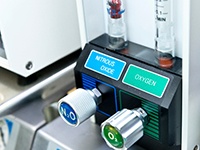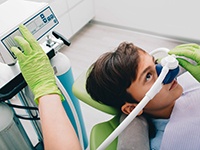
Sedation Dentistry - Dallas, TX
Stay At Ease During Dental Visits
Dental phobia is a real, widespread problem that can prevent patients of all ages from receiving important dental care, whether it happens because of a strong sense of discomfort in the treatment chair or a negative experience at a young age. To help patients and their families feel at ease again, Midtown Family Dentistry of Dallas offers calming sedation dentistry in our Dallas, TX dental office. To experience it for yourself, feel free to contact us and schedule a visit.

Why Choose Midtown Family Dentistry of Dallas for Sedation Dentistry?
- Fast-Acting Nitrous Oxide Available
- Inviting & Relaxing Dental Office
- Experienced & Gentle Dentists Who Put Your Comfort First
Nitrous Oxide Sedation

Nitrous oxide in Dallas is one of the best options for dental sedation. After all, this “laughing gas” is a safe and effective way to manage patient anxiety. It works so well, in fact, that most dentists who employ sedatives use it. Still, you may want to learn more about nitrous oxide before committing. (Doing so helps you know if the service is right for you.) As such, we at Midtown Family Dentistry have listed a summary of its details below. If you’re interested, then, keep reading or call our office to book a visit!
Who is a Good Candidate for Nitrous Oxide?

Most adults and kids can qualify for nitrous oxide sedation — the service is really safe! However, the gas works best for patients with conditions like:
- A lasting fear of needles
- Dentist-related anxiety
- Inability to sit comfortably in the treatment chair
- Dental sensitivity
- A strong gag reflex
- Poor response to numbing agents
Admittedly, there are some for whom nitrous oxide isn’t a good choice. Patients who’re pregnant, have sinus congestion, or take certain medications might face side effects. Therefore, we must review your medical history and check for potential complications. That way, we can decide whether nitrous oxide is the right option for you.
How Does Nitrous Oxide Work?

Applying nitrous oxide isn’t a complex process. In fact, setting it up only takes a few minutes at most.
For starters, you’ll inhale the gas through a nose mask we provide before treatment. This method ensures the sedative quickly enters your body. As the nitrous oxide starts to work, we’ll also monitor your vitals to confirm your continued safety.
Once the gas takes effect, you may feel light-headed, tingly, or even heaviness in your arms or legs. Whatever else you experience, though, you should be calm and comfortable during the procedure. You’ll also remain awake and lucid enough to answer the dentist’s questions or instructions.
Aftercare for Nitrous Oxide

Because its effects don’t linger, nitrous oxide doesn’t usually involve much aftercare. This fact is one reason many patients prefer it as a sedation method.
That said, you should still be careful after treatment. It can take a few minutes before nitrous oxide fully exits your body. Therefore, wait until you feel like your usual self before driving anywhere.
After the gas wears off, you can go ahead and return to your usual tasks — school, work, chores, etc. Remember, though, to follow any specific recovery instructions you receive. Otherwise, you might face unnecessary complications.
Sedation Dentistry FAQs

Even if you’re considering sedation dentistry, you likely feel hesitant. Maybe you think you don’t understand it well enough. That said, perhaps you don’t know how to ease your concerns. Fortunately, Midtown Family Dentistry has you covered: listed below are some popular sedation questions and their answers. By reading them over, you should grasp how our sedatives work. If the facts you want aren’t here, though, never fear; just call our office for the details.
Will I remember anything from dental sedation?
Dental sedation typically leaves you awake and alert. (That way, you can respond to a dentist’s instructions.) Nonetheless, it’ll probably make you forget much of your procedure.
You see, some sedatives are known to cause short-term amnesia as a side effect. Our office’s nitrous oxide happens to be one of them. As a result, your memories of treatment may end up fuzzy.
Still, this memory loss effect isn’t exactly a bad thing. For starters, it won’t affect memory formation after the treatment; you’ll recall later events just fine. Furthermore, forgetting a procedure can make care easier for patients with extreme anxiety or trauma.
Is sedation dentistry covered by insurance?
Unfortunately, no – sedation dentistry usually isn’t covered by dental insurance. Most plans consider it a luxury and thus medically unnecessary. As such, they normally won’t cover its cost.
However, there are occasional exceptions. Coverage may apply if a disabled patient needs sedation for preventive care. Similarly, sedation might be covered for complex procedures like multiple tooth extractions.
Ultimately, every insurance plan is different. Some can offer sedation coverage, while others don’t. Therefore, confirm your benefits before pursuing treatment. Our team can help you navigate your policy if you need help.
Will I feel any pain from dental sedation?
To be clear, dental sedation is a painless process. It won’t cause aches or discomfort to any body parts. On the contrary, this service should make your procedure quite smooth and comfortable.
Aside from keeping you calm, most dental sedatives suppress your body’s pain response. The result is that the dentist’s work will only feel like pressure instead of irritation. In other words, you won’t be compelled to cringe or flinch as treatment proceeds.
Of course, your dentist may also numb your mouth with a local anesthetic. This action would outright prevent oral tissue from feeling pain. From there, you won’t need to fear potential aches.
Does dental sedation make you tell secrets?
Some rumors suggest dental sedation is a “truth serum,” forcing you to tell secrets against your will. Patients who hold this view will then avoid seeing their dentists. Luckily, though, there’s no need for worry – sedation dentistry won’t make you “spill the beans” about anything.
To be more specific, dental sedation isn’t a truth serum. It won’t make you yell out anything you don’t want to say. Even if you do mention something unusual, the occurrence will be a coincidence at best. Plus, your words will be kept within the walls of the dental treatment room.
I Need a Checkup & Cleaning I am Looking for a Dentist for My Child I am Concerned About Bleeding Gums I Have a Cavity or Broken Tooth I am Missing One or More Teeth I am Unhappy with My Smile I Want a Straighter Smile I am in Pain & Need Help I Need My Wisdom Teeth Removed View Our Services